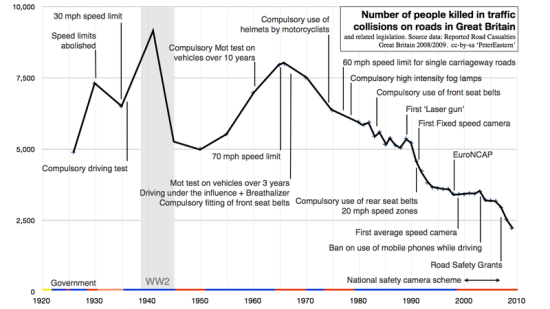I like to follow the MotoGP. MotoGP involves riding incredibly powerful motorbikes around a track at extremely high speeds in very precise racing lines in close proximity to other bikes. It takes a hell of a lot of skill and no small amount of luck. Sometimes it goes wrong, as in the recent accident when Marco Simoncelli died following a collision during the race.
Is racing fun? Definitely. Is it dangerous? Hell yes! Why, then, do they do it?
Simple. Because they want to.
Step back now and look at the roads that we drive on every day. They are definitely not to be compared to a racetrack, and yet they are still dangerous. In 2008 in the UK there were 228,000 injuries in road traffic accidents. Of those, 26,000 were serious injuries, 2,538 died, and the remaining 202,333 were minor injuries. In air travel, globally there were 884 people killed in 2008 in 156 accidents. I couldn’t find statistics for injuries compared to deaths, but I’m assuming that nearly all aircraft accidents are fatal. (Statistics from Wikipedia, links below.)
Most people are aware of the risks, but nearly everyone will sill travel by road and by air. I think that is for two reasons. Firstly, the actual chances of an individual being in an accident are pretty small. Secondly, we make a trade off - we all take risks everyday, either for convenience or for fun. Those risks extend to most aspects of life, and yet I think road safety is subject to far more campaigning and legislation than most things. I think making the roads safer for us all is very important and I am grateful for all the additions that help with that - seatbelts, airbags, ABS brakes, MOTs, and thousands of other improvements. I think that the campaigning goes too far though. For one thing, I think that the effect of speed on accident rates is exaggerated by safety campaigners. When there are accidents that could have been avoided I believe that the problem is usually not speed, but other failings of the driver like following other vehicles too closely, not concentrating on the road or looking before manoeuvring, or misjudging weather conditions. Safety campaigners argue that the national speed limit should not be raised from 70mph to 80mph because it would cause more accidents, but would it really? I suspect that actually it will make no difference and I think that unless the speed limit were reduced down to 30 or 40mph then the severity of accidents wouldn’t change either.
We should not forget that when motorways were first introduced they had no speed limit. There were many accidents, however those accidents for the most part were not caused by inability to control a car at speed, but the inability of the cars to maintain those speeds without falling apart or exploding. Cars then were rickety, had few safety features, and many unsafe design decisions, and their engines and parts could not deal with high speed travel without overheating or wearing out. In addition cars in much poorer condition were allowed on the road. Modern safety features and MOT checks have changed all that and cars are far safer and more capable now and so I believe the 70mph speed limit to no longer be necessary.
Many bikers are increasingly worried about new and proposed regulations affecting motorbikes and especially regulations coming from the EU. Motorcycle Action Group (MAG) and other groups have even staged protests against many of these laws which would mandate taking away absolute control of the throttle and ban home maintenance or making changes to parts of the bike, among other things. There are even some who are calling for an outright ban on motorbikes.
I believe this to be absurd, and not just because I ride a motorbike myself. When riding, people again make a choice between risk and convenience or enjoyment. These rules would remove that choice from people. A great many people ride motorbikes for enjoyment, but most also ride motorbikes because bikes and scooters are the cheapest and simplest way for many people to get around. These changes would destroy that advantage and make motorbikes costly and complex.
I think the arguments against raising speed limits for safety reasons are null and void. If the rise is unsafe, and if motorbikes are unsafe, then so are cars. Where does it end? The only logical conclusion is to ban road travel. And then ban kitchen knives and hot cooker hobs. And ban lawnmowers. And… well, you can see where I am going. We always take some risks just to get on with our lives, and we make choices about the amount of risk and the trade-off made.
Finally, I should point out that many people are against a speed limit increase for environmental reasons. That’s fine, but you should note that it is a separate issue from speed, and that it also rules out speed increases that are more environmentally friendly. If an electric car were charged by wind-power, why shouldn’t it travel at 80mph?
And so I’m in favour of increasing the speed limit. Actually, I’m in favour of abolishing speed limits on motorways altogether. It works for Germany.
All of the above is my own opinion and is changeable subject to rational arguments or actual research and statistics.
Links
Reported_Road_Casualties_Great_Britain [Wikipedia]
Aviation_accidents_and_incidents [Wikipedia]
EU Hands Off Biking! [MAG]
Ban motorcycles, safety expert says [Telegraph]


